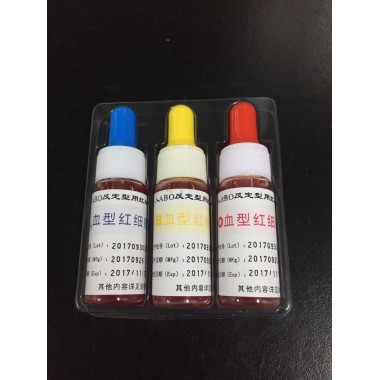BLOOD GROUPING REAGENT KIT
(MONOCLONAL ANTIBODY)
SUMMARY
Anti-A, Anti-B, RhD (IgM) are derived from the corresponding supernatants of mouse hybridoma cell cultures. Each batch of reagent undergoes rigorous quality control at various stages of manufacture for its specificity, avidity and performance.
Human red blood cell antigens can be divided into four groups A, B, AB and O depending on the presence or absence of the corresponding antigens on the red blood cells.
PRESENTATION
RhD (IgM) Blood Grouping Reagents(Monoclonal Antibody) 1×10ml
Instruction for use.
REAGENT STORAGE AND STABILITY
1. Store the reagent at 2-8ºC. DO NOT FREEZE.
2. The shelf life of the reagent is as per the expiry date mentioned on the reagent vial label. Once opened the shelf life of the reagent vial is as described on the reagent vial label provided it is not contaminated.
PRINCIPLE
Human red blood cells possessing A and/or B antigen will agglutinate in the presence of antibody directed towards the antigen. Agglutination of red blood cells with Anti-A, Anti-B reagents is a positive test result and indicates the presence of the corresponding antigen. Absence of agglutination of red blood cells with Anti-A, Anti-B reagents is a negative test result and indicates the absence of the corresponding antigen.
Human red blood cells possessing the D antigen will agglutinate in the presence of antibody directed towards the antigen. Agglutination of red blood cells with RhD (IgM) reagent is a positive test result and indicates the presence of D antigen. No agglutination with the reagent is a negative test result and indicates the absence of D antigen.
SAMPLE COLLECTION AND PREPARATION
No special preparation of the patient is required prior to sample collection by approved techniques. Samples should be stored at 2-8C if not tested immediately. Do not use haemolysed samples.
TEST PROCEDURE
Bring reagents and samples to room temperature before testing.
Slide Test
1. Place one drop of reagents using the reagent vial dropper separately on a clean glass slide.
2. To each reagent drop, add 50µl whole blood (only for Anti-A Blood Grouping Reagents), or 10% suspension of the red cells.
3. Mix well with a mixing stick uniformly over an area of approximately 1 cm.
4. Rock the slide gently, back and forth.
5. Observe for agglutination macroscopically at two minutes.
Tube test
1. Prepare a 5% (Anti-A, Anti-B Blood Grouping Reagents) or 2-4% (RhD (IgM) Blood Grouping Reagents) suspension of the red cells to be tested in isotonic saline.
2. Place one drop of reagents using the reagent vial dropper into corresponding labeled test tubes.
3. Pipette into each of the test tubes, 50µl of the test red cell suspension and mix well.
4. Centrifuge for 1 minute at 1000 g or rest for 1 hour at room temperature .
5. Gently suspend the cell button, observing for agglutination macroscopically.
INTERPRETATION OF RESULTS
Slide and Tube Tests
a) Agglutination is a positive test result and indicates the presence of A and/or B antigen. No agglutination is a negative test result and indicates the absence of A and/or B antigen.
b) Agglutination is a positive test result and indicates the presence of D antigen. No agglutination is a negative test result and indicates the absence of D antigen.
REMARKS
1. As undercentrifugation and overcentrifugation could lead to erroneous results, it is recommended that each laboratory calibrate its own equipment and the time required for achieving the desired results.
2. After usage, the reagents should be immediately recapped and replaced to 2-8C storage.
3. Results of forward grouping obtained by using Anti-A, Anti-B reagents should always be reconfirmed by performing reverse grouping with known red cells. If there is discordance, do not report the result and pursue blood identification in compliance with current recommendations and protocols or forward the sample to an expert laboratory.
4. It is strongly recommended that red cells with known ABO characteristics, and RhD positive and RhD negative red cells should be occasionally run, preferably on a daily basis to validate the reagent performance.
BEIJING KINGHAWK PHARMACEUTICAL CO., LTD




